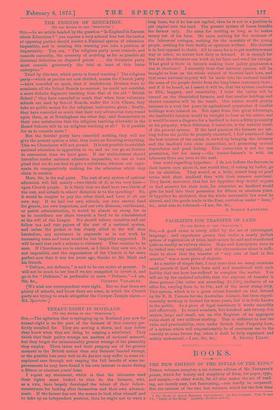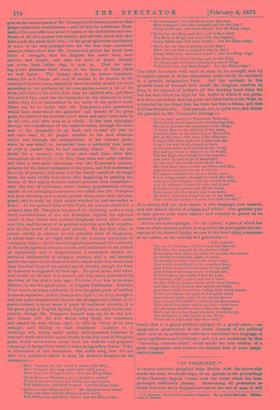BOOKS.
THE NEW EDITION OF THE IDYLLS OF THE KING.*
THESE volumes complete a six-volume edition of Mr. Tennyson's poems, which for beauty and simplicity of form, for paper, type, and margin,—in other words, for all that makes the act of read- ing, not merely easy, but fascinating, —can hardly be surpassed. But the interest of the two last volumes, which for the first time • The Works of Alfred Tennyson, Poel-Loureale. In Six Volumes. Vols. V. and VI.,' Idylls of the King." London: Strahan and Co. give us the various parts of Mr. Tennyson's Arthurian poem in their proper order and completeness,—and let him be Anathema Mara- nath a if he ever adds to or alters it again, to the distraction and con- fusion of all who possess this edition, and all who think that they have made the poem their own,—is the great splendour and beauty of some of the new passages here for the first time contained, passages which show that Mr. Tennyson's genius has never been fuller of strength, that his English has never been more nervous and simple, and that his level of poetic thought
has never been loftier than it now is. That the read- ing public professes itself weary of the theme of these Idylls we well know. The literary class is by nature impatient, asking for new things, and can ill endure to be present at the making of a great poem, especially when the artist moulds his work according to the guidance of his own genius,—here a bit of the brow, and there a bit of the foot, here an uplifted arm, and there the parted lips,—and lets the bystander see the elements in detail before they are all harmonised in the unity of the perfect work. There can be no doubt that Mr. 'Tennyson's own generation would have understood the grandeur and beauty of his great poem far better if his fourteen years' work had never been seen by as till now, aud then seen as a whole. It has been misjudged through the imperfection of the reader's vision, through the slow- ness of his sympathy to go back and re-read all that he had once read in its proper relation to the new elements added, and through the susceptibility of his literary pride, when he was asked to reconsider from a perfectly new point of view a matter that he had mentally closed. We do not 'doubt for a moment that those who shall form their first conceptions of the Idylls of the King from these two noble volumes will have a very great advantage over Mr. Tennyson's contem- foraries for the proper judgment of the poem, and will understand its unity of purpose, and enter into the stately march of its tragic story, far more vividly than those who, beginning by praising the beauty of four highly-finished cabinet pictures, were compelled— with the sort of reluctance which literary prepossessions always oppose to an enlarging conception—to admit that Mr. Tennyson had been brooding over a much .greater theme than they had sup- posed, and to make up their minds whether he had succeeded or failed. In the present form of the Idylls, no one can doubt for a moment that Mr. Tennyson has aimed at exhibiting, under a very finely moulded form of the old Arthurian legends, the spiritual secret of that divine and militant kingliness which alone makes men free, and the story of its gradual rejection and final repudia- tion by the world of sense and passion. He has done this, of course, chiefly in relation to the chivalric ideal of kingliness, in which there was no slight dash of the sensuous mysticism of a religions vision ; but he has throughout maintained the authority of the truly spiritual element of rule, and attributed to his Arthur an equanimity and a magnanimity, a composure amidst the sensuous excitements of religious emotion, and a sad serenity amidst the onset of the darkest doubts, which make him much more than the ideal king of the special age of chivalry, though the form of character is suggested by that age. No great poem, into what- ever mould of the past it is poured, can help being penetrated by the ideas of the poet's own age ; Paradise Lost was in no sense Hebrew, it was the great poem of English Puritanism ; Goethe's Faust was in no sense mediaeval, it was the great poem of modern Teutonic aspiration ; and so Tennyson's Idylls of the King, though it may not quite compare with these in the strength and volume of its poetic current, is in no sense a poem of mediwval chivalry, it is the great poem of Euglish loyalty, loyalty not so much to the con- science, though Mr. Tennyson himself says so, as to the per- fect human will, the will which truly obeys the conscience And asserts its own divine right to rule by virtue of its own strength and fidelity to that obedience. Loyalty to a -sovereign will, acting under mystic half-measured impulses of love and truth and noble moral wrath, is the key-note of this great poem, which nevertheless never loses the definite and gorgeous colouring of the age from which it takes its legendary theme. Take, as illustration of this conception, this noble song, here for the first time published, which is sung by Arthur's Knights on his coronation
Blow trumpet, for the world is white with May ;
Blow trumpet, the long night hath roll'd away,
Blow thro' the living world,—' Let the King reign.'
Shall Rome or Heathen rule in Arthur's realm?
Flash brand and lance, fall battle-axe upon helm, Fall battle-axe, and flash brand ! Let the King reign.
"Strike for the King and live ! His Knights have heard
-That God bath told the King a secret word. Fall battle-axe, and flash brand ! Let the Ring reign. "Blow trumpet! he will lift us from the dust. Blow trumpet! live the strength and die the lust Clang battle-axe, and clash brand? Let the King reign, "Strike for the King and die! and if thou (Hest The King is King, and ever wills the highest. Clang battle-axe, and clash brand ! Let the King reign..
"Blow, for our Sun is mighty in his May ! Blow, for our Sun is mightier day by day ! Clang battle-axe, and clash brand Let the King reign.
"The Ring will follow Christ, and we the King In whom high God bath breathed a secret thing. Fall battle-axe, and flash brand Let the King reign."
The belief in a royal will, royal at once by its strength and by- its mystic aureole of divine inspiration, could hardly be expressed in a grander imaginative form. And the contrast to ' this- splendid burst of triumph with which the kingdom receives its king, is the anguish of Arthur's all but fainting heart when his law has been found too high for the world to which it was given, and when just before that last great and fatal battle in the West, he- is haunted by the dread that his trust has been a dream, and that God has forsaken him. This passage, too, is quite new, and almost the grandest in Mr. Tennyson's writings :-
"For on their march to Westward, Bedivere,
Who slowly paced among the slumbering host, Heard in his tent the meanings of the King •
found Him in the shining of the stars, I mark'd Him in the flowering of His fields, But in His ways with men I find Him not.
I waged His wars, and now I pass and die.
0 me ! for why is all around us here As if some lesser god had made the world, But had not force to shape it as he would, Till the High God behold it from beyond, And eater it, and make it beautiful?
Or else as if the world were wholly fair, But that these eyes of men are dense and dim, And have not power to see it as it is: Perchance, because we see not to the close; For I, being simple, thought to work His ill, And have but stricken with the sword in vain; And all whereon I lean'd in wife and friend Is traitor to my peace, and all my realm Reels back into the beast, and is no more.
My God ! thou hast forgotten me in my death : Nay—God my Christ,—I pass, but shall not the.'"
How stately and yet how simple is this language, how massive,. and how utterly devoid of enigma And riddle ! Our greatest poet at least grows even more natural and majestic in power as he matures in genius.
And in the noble epilogue to the Queen,' a part of which -has. been so often recently quoted, how grandly the poet applies his con- ception of the inward loyalty we owe to the true ruling conscience- of our nation, to our own day and generation :—
Take withal Thy poet's blessing, and his trust that Heaven Will blow the tempest in the distance back From thine and ours: for some are scared, who mark, Or wisely or unwisely, signs of storm, Wavering& of every vane with every wind, And wordy trucklings to the transient hour, And fierce or careless looseners of the faith, And Softness breeding scorn of simple life, Or Cowardice, the child of lust for gold, Or Labour, with a groan and not a voice, Or Art, with poisonous honey stol'n from France, And that which knows, but careful for itself,
And that which knows not, ruling that which knows To its own harm : the goal of this great world
Lies beyond sight : yet—if our slowly-grown And crown'd Republic's crowning common-sense, That saved her many times, not fail—their fears
Are morning shadows huger than the shapes
That cast them, not those gloomier which forego The darkness of that battle in the West, Where all of high and holy dies away.'
Surely that is a grand political epilogue to a grand poem ;—are imaginative presentation of the moral dangers of our political state such as no politician could have condensed into language of equal significance and vividness ; and yet one moderated by that "crowning common-sense" which marks the true wisdom of .a great imagination, and controls the hysteric fear of mere imagi- native passion.



































 Previous page
Previous page